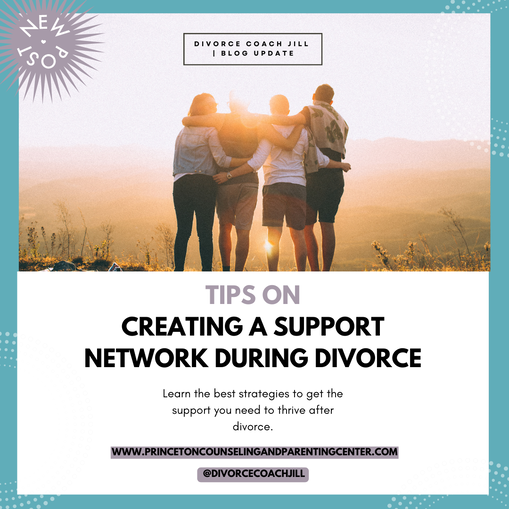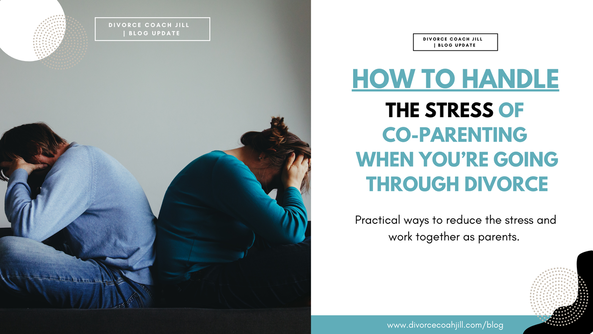|
Setting boundaries with your ex-spouse or any difficult person can be complicated. Many of us are taught as children that being nice means not asking for what you want but that’s exactly what you need to do when you’re an adult, as long as it’s in a healthy, respectful way. It can be challenging to set boundaries with someone who doesn’t respect them, but it is possible with the right approach. Here are some tools that will help you set boundaries with your ex-spouse or any difficult person:
1. Identify Your Boundaries The first step in setting boundaries is to identify them. Think about what behaviors or actions from your ex-spouse or difficult person are not acceptable to you. These may include things like name-calling, yelling, or invading your personal space. For everyone this is different. Really think about what you think is ok and what’s not ok. 2. Communicate Your Boundaries Clearly When setting boundaries, it is important to communicate them clearly. Be direct and specific about what behaviors or actions are not acceptable to you. Use “I” statements to express how their behavior makes you feel. You can’t worry about being nice - you can be respectful while not being nice and set a clear boundary. If you’re worried about how to do this, practice in a mirror or with a close friend. If you talk around an issue instead of stating it clearly, the person may not understand what your boundary is. 3. Stick to Your Boundaries Many people communicate a boundary and think that’s the end of setting a boundary. Actually, that’s just the beginning. Once you have communicated your boundaries, it is important to stick to them by doing something. This may mean walking away from a conversation or ending a phone call if your ex-spouse or difficult person crosses a boundary. Sticking to your boundaries is the only way to show that you are serious about them. 4. Don’t Engage in Arguments You don’t have to say anything once you’ve communicated a boundary clearly. Defending or arguing will only escalate the situation and make it more difficult to set and maintain boundaries. Stay calm and don’t get defensive when communicating your boundaries. 5. Seek Support You may have difficulty setting boundaries because of experiences you had when you were a child when you tried to set a boundary. It’s important to seek support from friends, family, or a therapist. They can provide you with emotional support and help you stay accountable to your boundaries. Setting boundaries with your ex-spouse or any difficult person can be challenging, but with these tools, you’ll be able to set clear boundaries, avoid escalations and arguments and stick to the boundaries that you set. If you haven’t been able to set boundaries in the past, it may take some time and patience to get good at these skills. Practice using these tools and eventually you’ll be awesome at setting boundaries with everyone you need to in your life! Marriage is hard! It takes work, sacrifice and compromise. And it helps to have a childhood with parents who had a good marriage, which is not that common. But even if you had good roles models from your parents, you still can go through tough times in your marriage. All long-term marriages go through ups and downs. So what do you do if you’re in one of those down times?
You have several choices: 1. Do nothing. You can detach from your partner, do your own thing and hope you both let things go. Eventually things could get better. 2. Ask for a divorce. You’ve been unhappy for a while and you’re sick of feeling this way. You don’t know what else to do so you think that divorce is the only answer. 3. Marriage counseling. An experienced marriage counselor can help you work through past hurts and build new skills that can improve your relationship. 4. Marriage retreat. This is where you spend a weekend with an experienced professional, and other couples who are struggling, and work intensely on improving your marriage. You can make a lot of progress in a relatively short amount of time. 5. Individual counseling. Individual counseling is never a bad thing to do. You’ll benefit no matter what happens to your marriage. What if your spouse won’t agree to do anything? Then you have a limited amount of choices but you still have choices. What if you’ve tried marriage counseling and it hasn’t worked? Then individual counseling or coaching can help you make the decision about what you want to do. There are many people who stay in unhappy marriages because they’re too scared to do anything else. And it is scary to face your problems head on. But if you have the right support, you’ll be amazed how strong you are. Reach out if you need someone to walk with you through this journey – whether it’s how to save your marriage or how to get yourself prepared for divorce. I’m a marriage counselor, individual therapist and coach and I can support you wherever you’d like to go. Contact me at [email protected] If your spouse tells you they want a divorce, the first thing that you have to determine is if they’re serious. Many married people talk about divorce but don’t really mean it, which is really bad for a relationship. If your spouse has been doing that, you need to make sure they know that it’s not ok to talk about divorce unless they’re absolutely sure that’s what they want.
If your spouse is serious, here are some things that you can do:
When your spouse tells you they want a divorce, it can be completely overwhelming. Remember to stay calm, educate yourself and get support so that you’ll be able to think clearly and not emotionally and move forward in a constructive way. Going through divorce can be one of the most challenging experiences of your life. It's easy to feel overwhelmed, stressed, and uncertain about what the future holds. However, it's important to remember that divorce doesn't have to mean the end of happiness. By taking proactive steps to care for yourself and your emotional well-being, it's possible to find happiness again, even during the divorce process.
One powerful tool for finding happiness during a divorce is divorce coaching. A divorce coach is a trained professional who can provide guidance, support, and resources to help you navigate the emotional and practical aspects of the divorce process. A divorce coach can help you manage your emotions, communicate effectively with your ex-spouse, and develop a plan for the future that meets your needs and goals. Here are three steps you can take to find happiness again during a divorce: 1. Take time for self-care: Divorce is a stressful and emotional experience, and it's important to take care of yourself during this time. Make time for activities that bring you joy and relaxation, such as exercise, meditation, or spending time with friends and family. 2. Focus on the positive: When going through a divorce, it's easy to get caught up in negative thoughts and emotions. Instead, focus on the positive aspects of your life and the things you are grateful for. Practicing gratitude can help shift your mindset and improve your overall well-being. 3. Develop a plan for the future: While divorce can be a difficult process, it's also an opportunity to create a new life for yourself. Take time to think about your goals and aspirations for the future, and work with a divorce coach to develop a plan that aligns with your vision. If you're going through divorce and want support and guidance to find happiness again, I can help. As a divorce coach, I offer personalized support and resources to help you navigate the challenges of divorce and create a plan for a brighter future. Contact me today to schedule a consultation and learn more about how divorce coaching can benefit you. To contact me for divorce coaching, visit my website at www.divorcecoachjill.com. You can schedule a consultation to learn more about my services and how I can help you through this challenging time. With my support and guidance, you can find happiness again during and after the divorce process. Going Through a Divorce on a Budget: 5 Tips for a Less Stressful and Less Expensive Experience2/20/2023 Going through a divorce can be an incredibly stressful experience, especially if you are trying to do it on a budget. However, there are ways to minimize the stress and the financial impact of divorce. Here are five tips to help you have a less stressful and less expensive divorce:
1. Be organized. Keeping track of all of your financial documents, bills, and other important information is crucial during the divorce process. Collect at least 3 years of credit card bills, bank statements and tax documents. This will help you to understand your past spending patterns and prepare a budget so that you know what you need to live on. 2. Seek mediation instead of litigating. Mediation is often a faster, more affordable, and less adversarial option than going to court. In mediation, a neutral third party helps you and your spouse to reach an agreement on all of the issues related to your divorce, including finances, property division, and child custody. 3. Communicate with your spouse. Communication is key to a successful divorce, especially when it comes to finances. Try to understand your soon-to-be-ex’s (STBX’s) point of view and that both of you are probably worried about finances. Try to be transparent about your financial situation and be open to negotiating a settlement that works for both of you. This can help you to avoid costly and time-consuming legal battles. 4. Hire a divorce coach. Divorce coaches, like me, can provide support, guidance, and resources to help you navigate the divorce process. They can also help you use your attorney and other divorce professionals more efficiently. A divorce coach will help you manage your emotions so that you can make smart decisions as you go through divorce. In addition, divorce coaches can help you prepare for mediation and feel confident that you’re making the best decisions for your future. 5. Work with your STBX to come to agreement on as much as you can without the use of attorneys, mediators or other divorce professionals. The more that you can agree to on your own, the less you’ll spend on your divorce. Divide the items in your house, talk about custody and parenting schedules and what you want to do with your cars on your own if you can. We all know that divorce can be a stressful and expensive experience, but there are ways to minimize the stress and financial impact of divorce. If you’re organized, choose the right divorce process, communicate effectively with your STBX, hire a divorce coach and handle some of the negotiation on your own, you can have a much less stressful and less expensive divorce experience. Divorce can be a difficult and lonely experience. Having a strong support network during divorce can make a world of difference. Building a support network can be tricky as people going through divorce can feel shame about the divorce and can isolate themselves. Below are several ways to create a supportive network during a divorce.
Friends and Family Your support network should include people who are understanding, non-judgmental, and have your best interests at heart. These people could include close friends, family and others in your network such as mentors or religious professionals. It’s important that you let them know what you need from them because they may not know how to help you. Do you need them to listen? Do you want advice? Do you just need them to help with the kids? Clearly communicating what would help you the most is key to having the right support around you during divorce. Community While friends and family are an important party of your support network, they may not understand what you’re going through. If they haven’t been through divorce, they probably don’t really know how overwhelming and devastating divorce is. They may say the wrong thing or be so consumed with their own feelings that they can’t support you. That’s why support groups and other divorce communities can be so helpful. There are many online and in-person divorce support groups and communities. Connecting with others going through divorce helps you recognize that you’re not the only one who’s feeling so devastated. It can help with the healing process. Listening to others stories and hearing about others who’ve survived divorce can give you hope for the future. They can share what has worked for them and what hasn’t which can help you have a better idea of how to move forward. Professional Help There are a number of divorce professionals that can help you as you go through divorce. Many people hire an attorney and let the attorney lead their divorce. That can lead to an increase in cost and conflict. Here are professionals that you can use during your divorce:
Remember, asking for help is a sign of strength, not weakness. Your divorce does not have to define who you are. It is a transition and a new chapter in your life. By creating a strong support network and taking advantage of the services of a professional such as divorce coach, you can move forward with your life in a positive and healthy way. The holiday season is supposed to be a joyful time but for many people who are going through difficulties, holidays can be tough. Divorce, loss, an illness or a marriage that’s in conflict can all make holiday time less joyful. But there are things that you can do to make the holidays better, even if you’re dealing with tough times.
1. Don’t put extra pressure on yourself There is no rule that you have to celebrate the holidays in a certain way every year. Do you like having a big celebration or would you rather do something smaller and casual? Maybe you want to watch movies, read a book or go snowshoeing. You get to decide each year how you’re going to celebrate the holiday season. You don’t have to do what you’ve done in the past. You can make new traditions based on what’s best for you. This year, take the pressure off of yourself and create memories in a different way so that you can put your feet up and relax. You deserve it! 2. Spend the holidays with who you want to spend it with You don’t have to spend the holidays with people who aren’t kind, caring and supportive of you. If you’re used to spending the holidays with family members who make you uncomfortable or who don’t really understand you, take a break from them this year. If you’re divorced and don’t have your children, find a good friend or family who you want to be with. If your in-laws are not who you want to be with, spend the time with just your immediate family. Too may times, we do things because we’ve done them in the past. This year, do what works best for you. 3. Make sure that you reach out to loved ones Many people who are struggling during the holidays don’t tell their loved ones how they feel. They may be ashamed or don’t want to bother anyone. But people who are close to you would probably want to help. They might be going through their own struggle and they would benefit from connecting with you. If you don’t have anyone you feel comfortable talking to, you can always reach out to a therapist. 4. Focus on the positives Even if times are tough there are always positive things going on in life. Every day you can watch the sunset or take a walk in nature. You have your good health or your children to focus on. You are able to walk, ride a bike and take a warm bath. There are so many small things that we take for granted that we can be grateful for. What is positive in your life? Final Thoughts When you’re going through a difficult situation, it can be hard to get through the holiday season. Make sure that you don’t put unnecessary pressure on yourself, you’re intentional with who you spend your holiday with, reach out to loved ones and focus on the positive. There are ways to turn around a holiday season that you’re dreading and make it into a positive experience for you and your family. Divorce is a difficult and overwhelming experience and can be especially challenging for those who are co-parenting with their soon-to-be-ex (STBX). You want what's best for your children but you may have difficulty communicating with your STBX. You both may have hurt, angry, and resentful feelings toward each other. There are things you can do to reduce the stress of co-parenting and make it more effective.
1. Communicate with your ex as much as necessary. It's critical to keep the lines of communication open for the sake of your children. Schedules, pick-ups and drop-offs, extracurricular activities, medical issues and other details should be discussed. The more you can agree on in advance, the less stressful things will be when they arise. And, if disagreements do arise, try to handle them calmly. You don't want your children to see you arguing or hear negative things about their other parent. But you don't have to communicate about anything unrelated to the children. If there's something going on that you'd rather not tell your STBX, it's ok to keep it private. You're navigating a new relationship with your STBX and you can decide how much you share and how much you keep to yourself. 2. Do not use your children to communicate. Using your children to communicate will only harm your children in the long run. Your children should never feel responsible for things that happen between their parents. If they are required to communicate because you aren’t able to, your children can feel an incredible amount of stress. It’s best to find ways to communicate including text, email and phone calls. 3. Focus on your future. You and your STBX’s relationship is changing. You’re no longer going to be married, you’re going to be co-parents. That means that everything that happened in the past doesn’t really apply to your new relationship. Let go of the past and focus on your future as co-parents who both care about your children. Be polite and respectful no matter what your STBX does. Eventually you’ll be able to develop a healthy co-parenting relationship. Make sure that you’re taking care of yourself so that you won’t be triggered by any inappropriate text or confrontational attorney letter. 4. Talk about feelings with your children Divorce brings up so many emotions. It’s important that you create an environment where your children can express all of their feelings, even if it’s difficult to hear. Ask your children how they’re feeling and listen to what they say. Listening without talking is an essential skill that parents need to be effective at. When your child expresses a fear, ask them to tell you more. Then ask them, “Is there anything else?” When your child is completely done talking, then you can try to address some of their concerns without minimizing them. Empathize with them and say, “I can see why you feel that way.” Be honest with your children and let them know that it’s hard for you too but let them know that you’ll all be ok. Come up with ideas together on how you can make things better. If your children feel comfortable talking about their feelings, you can all move forward and have hope for a really good future. Final Words Divorce is one of the most difficult things to go through in life. You have to take care of yourself to manage the stress of co-parenting. If you communicate effectively with your STBX, focus on your future and talk about feelings with your children, you will have an easier time managing the stress of divorce and co-parenting. If you’re struggling with any of this, reach out to a therapist or an experienced divorce coach. It's normal to feel angry from time to time. But when anger starts to take over, it can negatively affect your mental and physical health and relationships. If you're struggling to let go of anger, read on to learn how to let go of anger and focus on the present.
1. Figure Out What Triggers Your Anger The first step in dealing with anger is to figure out what makes it happen. Is it a person or a situation that you’re dealing with? Or is it a general sense of being upset or powerless? You may be angry at yourself for doing something that you regret. If you aren’t sure where your anger is coming from, take some time the next time you get angry and think about what led up to the feeling of anger - what were you feeling before the anger? Once you know what makes you angry, you can start planning how to handle it. You can learn to deal with your anger in a healthy way. You can calm down by taking deep abdominal breaths, counting to 10, listening to music or going for a walk. Whatever works for you, it's important to have a plan, so you don't let your anger get the best of you. 2. Be Assertive, Not Aggressive, When Communicating Being assertive is very different from being aggressive. When you're assertive, you can tell the other person how you feel honestly and politely without putting them down or yelling. This is the best way to get across what you want to say without making things worse. On the other hand, being aggressive means letting your anger get the best of you and saying or doing things that you might regret later. Before you say anything, try to take a step back and take a few deep breaths if you find yourself getting angry. This will help you stay calm and in control of your emotions so that you can communicate effectively. 3. Learn Relaxation Techniques Relaxation techniques can help you healthily manage your anger. Deep breathing is a straightforward technique that can help you calm down. To do this, breathe in slowly and deeply through your nose, counting to four. Then breathe through your mouth, again counting to four. Repeat this several times until you start feeling relaxed. Other relaxation techniques include reciting a mantra (like “I’ll be ok”), meditation or visualization where you visualize a peaceful or happy place. 4. Practice Compassion If we can step back and try to see things from the other person's point of view, we can often feel sorry for them instead of angry. Having compassion for another person can help you let go of anger. Letting go of anger does not mean that you’ve forgiven the person. It means that you can release all of the angry emotion and move forward. You’ll be amazed at how good it feels to let go of anger and move forward in your life. 5. Talk to Someone Many people suppress their anger until it becomes unbearable. They believe that keeping their emotions to themselves will help them cope. However, when anger is bottled up, it can only go inward. This can lead to depression or exploding in an uncontrollable outburst later. Expressing your angry emotions in a safe and controlled environment is a much better option. Knowing that you have someone to help you process your emotions can be extremely beneficial. You can confide in a trusted friend or family member, a therapist, a coach or religious advisor. Having an outlet can keep your anger from escalating and causing other issues. Final Words It takes work to focus on the present moment and let go of anger. It takes time, patience, and effort, but the benefits of living anxiety-free and in the moment are priceless. You don't have to suffer or try to solve everything alone—asking for help is a sign of strength. Seeking professional help demonstrates that you value your well-being and are willing to make positive changes in your life. Divorce mediation is a process where you and your soon-to-be-ex (STBX) work with an impartial third party to negotiate the financial and parenting aspects of your divorce agreement. There are ways to prepare yourself emotionally for the divorce mediation process to make it less stressful and more effective.
Keep In Mind That It's Not About Who Wins or Loses You and your STBX are going to have disagreements as you go through your mediation process. It’s important to remember that winning is not as important as reaching an acceptable agreement for both parties. Be prepared to let go of the need to win and instead focus on finding a resolution that works for both of you. Know What’s Important To You Knowing what’s important to you is key to understanding how to prepare for mediation. Think of the dream solution – if you could have everything you want, what would that look like? Then think about what you could give up. Do you want to keep the marital home? How important is that to you? Are you agreeable to 50% custody? Knowing what’s important to you and what you can give up will help you keep your emotions in check so that you can get to an agreement. Focus On The Future The purpose of divorce mediation is to agree on what’s going to happen in your and your children’s future. Sometimes during mediation one party brings up something that happened in the marriage in the past. It’s usually not helpful to discuss emotional issues from the past during mediation. If you or your STBX starts to do this, respectfully redirect your attention to discussions about the agreement and the future. Mediation is about moving forward so think about the following questions:
Keep Emotions Out Of It During mediation, you’re negotiating one of the most important transactions in your life. You must be able to think clearly in order to make all of the important decisions that you need to make. If you’re emotional, you won’t be able to think clearly. If you feel upset, take a few deep abdominal breaths and try to relax. It may also be helpful to take breaks throughout the mediation process to clear your head. Otherwise, you may say or do something that you'll regret later. Final Words Divorce mediation can be a very difficult, emotional process. However, by preparing yourself mentally and emotionally for the journey ahead, you can make the experience a little more manageable. If you're considering divorce mediation, it's important to talk to someone who can help guide you through the process and offer support. A divorce coach can be an invaluable asset during this time – they can provide information about what to expect during mediation, help you prepare for mediation, and help keep you accountable throughout the process. |
AuthorJill Barnett Kaufman, MSW, LCSW and Certified Parent Educator is an experienced clinician who helps clients discover new ways to resolve a variety of challenges and bring more happiness and peace into their lives. Archives
November 2023
Categories
All
|
|
If you are in crisis or in need of emergency assistance, please call 911. |
|












 RSS Feed
RSS Feed


